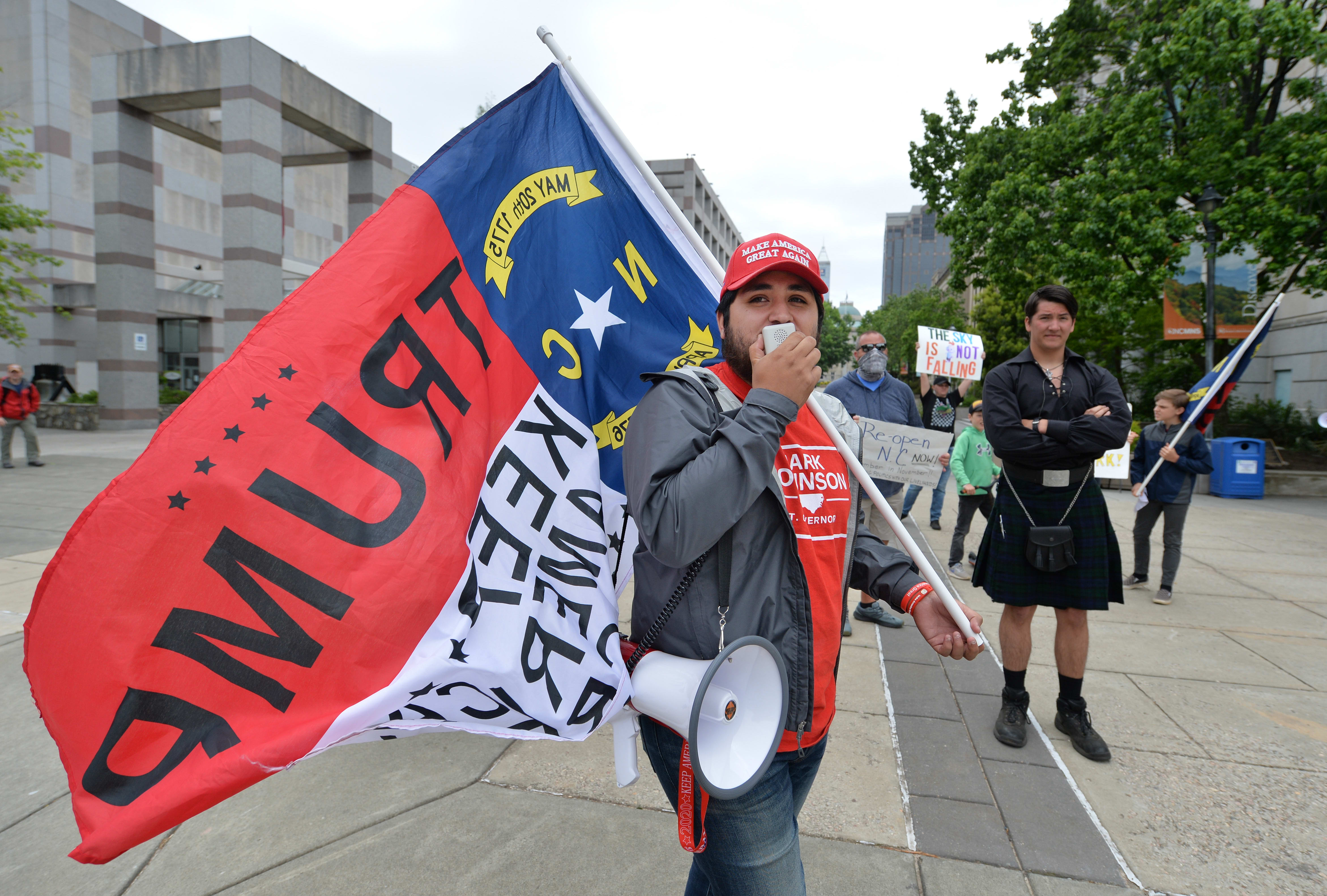
10:18 am: Tyson Foods to restart limited pork production after closure
Tyson Foods will restart limited production at its largest U.S. pork plant on Thursday after weeks of being shuttered, according to a report from Reuters.
The reopening follows an executive order by President Donald Trump to keep meat facilities operational in order to shore up the country’s food supply.
Tyson said all employees who will be returning to the plant have been tested for Covid-19. —Sara Salinas
10:15 am: Uber lays off 3,700 employees
Uber CEO Dara Khosrowshahi during the Bloomberg Global Business Forum in New York, September 25, 2019.
Shannon Stapleton | Reuters
Uber is laying off 3,700 employees, or roughly 14% of its staff, the company announced in a filing with the Securities and Exchange Commission.
The cuts will impact Uber’s recruiting and customer support teams, according to the filing. CEO Dara Khosrowshahi will also forgo his base salary for the rest of the year. In 2019, he made $1 million in base salary though most of his compensation came from stock awards and bonuses.
Global gross bookings are down 80% during the coronavirus pandemic, according to a recent report in The Information. Investors will get a deeper look into Uber’s business on Thursday when the company reports earnings. —Lauren Feiner
10:06 am: Private payrolls lose record 20.2 million in April, ADP reports
Private payrolls suffered their biggest decline in history during April, with ADP reporting a job loss of 20.2 million as companies laid off workers amid efforts to stop the coronavirus spread. The biggest job losses came in the hospitality industries, which lost 8.6 million workers. Trade, transportation and utilities were next with 3.4 million while construction dropped 2.48 million. The numbers come two days before the Labor Department’s nonfarm payrolls report, which is expected to show an unemployment rate of 15%. —Jeff Cox
9:58 am: Fed President Bullard says April jobs report will be ‘one of the worst ever’
St. Louis Federal Reserve President James Bullard told CNBC the Labor Department’s upcoming report on April unemployment will likely be one of the worst the U.S. has ever seen.
The Fed leader said the unemployment rate will be “extremely high” and could exceed 20% in the next few months. “We’re going to see crazy ADP numbers today and the jobs report will probably be one of the worst ever on Friday,” he said.
His comments to CNBC came minutes before ADP reported that private payrolls shed more than 20 million jobs in April, by far the worst loss in the survey’s 18-year history. —Thomas Franck
9:52 am: Dr. Scott Gottlieb says coronavirus mutation study ‘doesn’t prove’ new strain more contagious
Dr. Scott Gottlieb stressed to CNBC the need for caution around a new study that suggests a new strain of the coronavirus could be more contagious than the original strain that emerged in Wuhan, China. “It doesn’t prove that this new strain is in fact more infectious,” Gottlieb said of the study, which was published by researchers at Los Alamos National Laboratory.
Gottlieb argued that more work needs to be done beyond the initial study, which has not yet been peer-reviewed. He said it’s only based on computational analysis and “we don’t have any other data to support it, including cell culture data.” —Kevin Stankiewicz
Disclosure: Gottlieb is a CNBC contributor who sits on the boards of Pfizer and biotech company Illumina.
9:46 am: Customers rushed to CVS for prescriptions and essentials, driving up drugstore chain’s sales
As the pandemic intensified, CVS customers ordered 90-day prescriptions, refilled medications early and stocked up on essentials in the front of stores.
That shift in shopping patterns led to a 9% jump in the drugstore chain’s same-store sales in the fiscal first quarter.
Customers’ use of digital services surged, too, CVS chief executive Larry Merlo said in an earnings call. Virtual visits with CVS’s urgent care service, Minute Clinic, are up 600% compared to the same quarter a year ago, he said. Home delivery of prescriptions is up more than 1,000%. And the company saw a four-fold increase in customers adding front store items, such as toilet paper, to their prescription deliveries.
Merlo said the company is still trying to figure out how the pandemic may change customers’ long-term habits. But, he said, “We expect that elements of today’s new norm will become part of tomorrow’s everyday routines.” —Melissa Repko
9:04 am: Concerns over coronavirus drop in 2020 swing states, CNBC/Change Research poll finds
Detroit residents line-up to be tested for free for the coronavirus disease (COVID-19) at the Sheffield Center in Detroit, Michigan, April 28, 2020.
Rebecca Cook | Reuters
About 68% of likely voters in six key 2020 swing states said they have “somewhat” or “very” serious concerns about Covid-19, a new CNBC/Change Research poll found. The share dipped from 76% in mid-April.
Fears among Republicans dwindled, while Democratic worries stayed about the same. Only 39% of likely GOP voters responded that they have “somewhat” or “very” serious concerns, a slide from 55% when the States of Play survey was last taken on April 17 and 18.
About 7 in 10 Republicans said the effects of the pandemic are getting better rather than worse. Only 12% of Democratic respondents said the same.
Larger shares of Democrats than Republicans said they are taking a range of precautions during the outbreak, from engaging in social distancing to sheltering at home and wearing a face mask in public.
The poll surveyed 3,544 likely voters in Arizona, Florida, Michigan, North Carolina, Pennsylvania and Wisconsin from May 1 to 3, and has a margin of error of plus or minus 1.7 percentage points. —Jacob Pramuk
8:41 am: Wendy’s US customers are returning
Wendy’s customers are starting to come back for Frosties and burgers. While the company’s weekly same-store sales for the U.S. remain negative, last week’s same-store sales only fell 2.1%.
Despite more consumers eating breakfast at home, Wendy’s U.S. sales are getting a boost from the breakfast menu, which launched nationwide in March.
Wendy’s U.S. business hit its low in early April, with same-store sales plunging 25.8%.
Read more on Wendy’s first-quarter results from CNBC’s Amelia Lucas. —Amelia Lucas
7:46 am: US Foods CEO says the industry will recover
7:03 am: German federal and state governments agree on path to easing restrictions
MUNICH, GERMANY – Germany has launched a nationwide policy that people should wear protective face masks in stores and public transportation after easing lockdown measures.
Alexander Hassenstein/Getty Images
The German government and its 16 states have agreed on a path to reopening large parts of the economy, according to a document viewed by Reuters.
Shops can reopen and some sports can resume with certain conditions, schools will gradually reopen and states will decide on their own about the reopening of restaurants, hotels and gyms, according to the document dated Tuesday. Reuters reported the document was prepared by federal chancellery chief Helge Braun and heads of regional chancelleries for a conference call Chancellor Angela Merkel is due to hold with state premiers on Wednesday.
States will decide whether to reopen universities, bars, trade fairs, cosmetic studious, brothels, theaters, cinemas and discos based on infection levels, Reuters reported. —Will Feuer
Read CNBC’s coverage from CNBC’s Asia-Pacific and Europe teams overnight here: Spain’s daily death toll rises again; EU to see sharp economic decline

